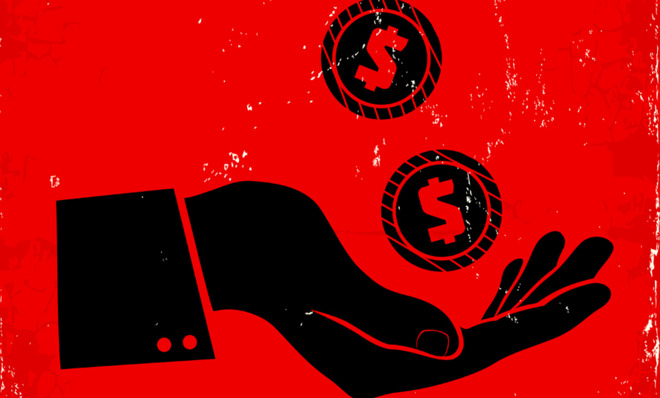I helped bankroll my brother — and came to regret it
Make sure you fully understand your expectations before loaning money to family, and make a plan together for how the money is to be used — before you give

A free daily email with the biggest news stories of the day – and the best features from TheWeek.com
You are now subscribed
Your newsletter sign-up was successful

My older brother and I have never been particularly close.
We got along well enough as children, but our relationship didn't grow into the strong, tight-knit kind I've seen other siblings share. Let's just say we're very different people: He's an introvert, while I'm a social butterfly. And the truth is that if we weren't family, we probably wouldn't run in the same circles.
But when I saw my brother start to struggle financially, I couldn't help but feel the natural tug to step in. He's family, after all, and I had enough room in my budget to spare a little.
The Week
Escape your echo chamber. Get the facts behind the news, plus analysis from multiple perspectives.

Sign up for The Week's Free Newsletters
From our morning news briefing to a weekly Good News Newsletter, get the best of The Week delivered directly to your inbox.
From our morning news briefing to a weekly Good News Newsletter, get the best of The Week delivered directly to your inbox.
So, really, it was a no-brainer when I made the decision to start giving him money — but it had to be secret, so he'd never realize it was me writing the checks.
A pattern of secret giving begins
My husband Mike* and I are no strangers to charitable giving. I'm a corporate executive and he's thriving as a business consultant, so we're fortunate to be in a financial position that allows us to give to various philanthropies and charities.
But no matter who the recipient of our charitable giving is, we've always followed a single guiding mantra: We're not looking to be heroes. My husband and I simply know that we've been blessed and want to share it with others — and giving anonymously allows us to do just that. What's the point of seeking recognition?
A free daily email with the biggest news stories of the day – and the best features from TheWeek.com
We also firmly believe that charity should start at home. So shame on me if I can write a check to a charity, but won't do anything to help a struggling family member.
My brother, Peter*, and his wife Samantha* had always struggled financially. In fact, my parents had been throwing money Peter's way for years — for down payments on homes, to pay various bills, and to buy school supplies for their kids.
But when I noticed him and Samantha facing particularly difficult money decisions, like whether or not to buy new clothes for their three children, I knew it was time for me to act.
That said, I didn't feel comfortable just handing Peter a check for fear of insulting him or making him feel self-conscious about his economic situation. So I got the idea to use our church as a way to facilitate the secret giving, and the fact that Peter also went to our congregation made the decision even easier. We simply wrote a check and asked the church to create a benevolence fund for Peter and Samantha. It was a win-win situation — and one that, to this day, my brother doesn't know about.
We covertly wrote checks this way to Peter and Samantha on two different occasions in the early 2000s, which added up to a total of about $2,500. And, for a while, it made a difference. I don't know exactly how they used the money, but Peter once told me how he felt cared-for by our church — that his community was looking out for him.
I was happy to hear that, and couldn't help but feel encouraged that maybe they were using the money wisely and learning good habits that would help them find their financial footing.
Well, I couldn't have been more wrong.

The $10,000 gift that changed everything
In the decade that followed our secret giving, Peter and his family managed to stay afloat — with more not-so-covert help from me and my parents.
My husband and I didn't mind occasionally footing the bill for random expenses. I picked up the check at restaurants. I covered the costs of some of their vacations. Years earlier, I'd even paid for their honeymoon — so this was nothing new.
To be fair, my brother never asked for this help. But with so many of his sentences beginning with, "We wish we could, but…," I felt inclined to step in when I could. Unfortunately, the opportunity to give anonymously didn't present itself again — from here on out, our efforts to help were completely transparent.
Was Peter grateful? I'm not sure. It wasn't something we talked about — I just did it.
Eventually, in 2011, Peter and his family moved to a different part of the country, and communication became less frequent — until disaster struck. While waiting for Peter's health insurance through a new job to kick in, Samantha suffered a stroke. Thankfully, she recovered, but it left them worse off financially than they'd ever been.
Between the hospital bill, anesthesiologists, surgeons and more, Samantha's stroke cost them upwards of $40,000. Whenever we spoke on the phone, which wasn't often, the picture Peter painted was bleak. He never outright asked for our help — but I knew he really needed it.
Mike and I agreed we couldn't just sit back and watch, so we sat down and seriously discussed what we could do. Because we've always had such a communicative relationship — and we both agree that family comes first — the conversation was easier to have than you might expect. Knowing we'd do the same if it were his family, Mike was fully on board.
The first thing we did was ask Samantha for access to her medical bills, so I could negotiate them down on her behalf. After sorting through the paperwork, I flew down to see Peter and share with him the plan that Mike and I had agreed to: We'd pay half of their largest bill, with the understanding that any ancillary medical expenses would remain their responsibility.
They agreed — and promised to set up pay schedules for the outstanding bills — although Peter seemed pretty solemn throughout the conversation. In fact, he barely made eye contact with me. I wasn't sure if he was thankful, ashamed or a mix of both.
As our visit came to a close, Samantha and I went to the hospital together to settle the $40,000 bill, which I had negotiated down 50 percent. I handed over my credit card and paid half of the outstanding balance — a grand total of just under $10,000.
This was met with tears and gratitude from Samantha — which is why I was surprised when our relationship began to cool shortly after.

Why I regret our decision to give
Peter and Samantha rarely reach out to Mike and me anymore. The phone calls have dwindled, and the emails are scarce. Do they feel guilty for the money we sacrificed for them? Embarrassed? Resentful of our more fortunate position? I have no idea.
What I do know is that they ended up filing for bankruptcy about a year after I paid their hospital bill — although Peter never actually shared this with me. It was my parents who let it slip.
Learning about the bankruptcy infuriated me: Had I known that there would be no real commitment to financial stability on their part — even after they'd agreed to cover the rest of the medical bills — I never would have given them the money.
Perhaps the worst part is hearing about how they are currently choosing to spend whatever money they have. My parents tell me Peter just dropped $700 on a new puppy. My 14-year-old niece is also getting a new iPhone 6. I don't even have an iPhone 6!
The hard truth is that my brother doesn't have a high-paying salary, but they do not deprive their children of anything. The latest jeans, electronics, shoes … When it comes to their kids, they never say no. Such careless spending is hard to swallow for me in light of their mounting financial responsibilities. In my opinion — and given my role in the situation, I feel entitled to an opinion — their financial obligations should take priority over impractical impulse buying.
My parents have also stopped extending money to Peter. My father's new stance is that he'll lend them cash if Peter provides a budget of how they'll spend it. Of course, no budget has ever materialized.
Over the years, my parents have given him over $70,000, which includes all the times he's lived with them as an adult. As for my part, I've given my brother something in the neighborhood of $15,000 over the years.
But I don't regret it because, at the time, I felt it was the right thing to do. I never had any illusions of being paid back — all the money was given as gifts. I'm more upset with the way my brother chose to use those gifts.
I've been thinking a lot about what I've learned from this process and I think it's this: If you're considering loaning money to friends or family, make sure you fully understand your expectations throughout the entire process, and make a plan together for how the money is to be used — before you give.
I've also learned that charitable giving is very different from familial giving. When giving to a charity, the donor is free of expectation — they just trust that the money will be distributed wisely. But when it comes to family, you can't always designate how the money will be used.
And another thing I know for sure? Next time I go out to eat with my brother, I will not be reaching for the check.
*Names have been changed
This story was originally published on LearnVest. LearnVest is a program for your money. Read their stories and use their tools at LearnVest.com.
More from LearnVest...
-
 Switzerland could vote to cap its population
Switzerland could vote to cap its populationUnder the Radar Swiss People’s Party proposes referendum on radical anti-immigration measure to limit residents to 10 million
-
 Political cartoons for February 15
Political cartoons for February 15Cartoons Sunday's political cartoons include political ventriloquism, Europe in the middle, and more
-
 The broken water companies failing England and Wales
The broken water companies failing England and WalesExplainer With rising bills, deteriorating river health and a lack of investment, regulators face an uphill battle to stabilise the industry